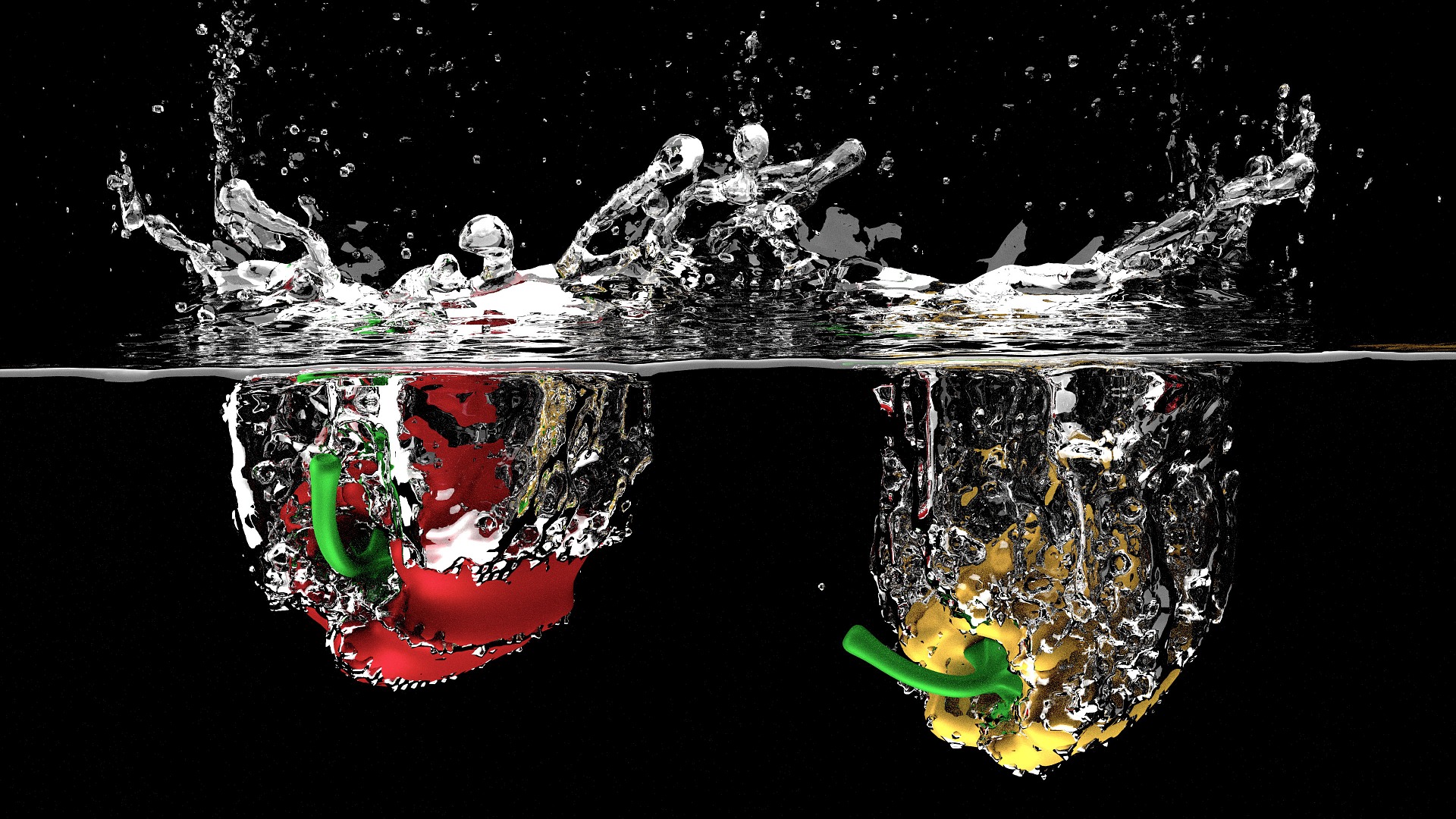When should we wash our fruits and vegetables?
When I get back from the market, my bags are always filled with fruits and vegetables.
I always take the trouble to wash them well before putting them into the refrigerator, even if they are organic. Some will say that it is better to wash them only at the time of use, but at home, I do it when arriving and I never had a conservation problem for my food. Moreover, so I assure myself that my little ones will not eat an apple that has never been washed.
Did you know that root vegetables are often the most affected by pesticides, as during the spraying, some of the pesticides enter the soil.
Why wash our fruits and vegetables?
First, to remove any dirt, dust and insects that could end up on it. But also to remove much of the pesticides / herbicides that would most likely still be on their surface. A good wash will also have the benefit of eliminating the parasites that could be on our food.
Many of our fruits and vegetables also have a layer of wax. Personally, I do not want to eat this layer of wax, do you?
As we have lives at 100 km / hr, this task must not be complicated.
Here’s how I do it: I have the children do it. It’s so convenient and it’s totally legal. Above all, you have to take advantage of it, because they love to help me… Anyway … for now they do!
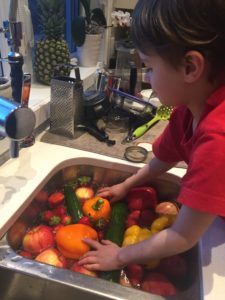
My recipe:
- Filled the sink halfway with water
- Add 1 1/2 cup White Vinegar
- 1/2 cup Sodium Bicarbonate **
- 5 drops of lemon essential oil
- Mix well and add fruit and vegetables.Soaking time?
** When I add sodium bicarbonate to the mixture of vinegar and water, a “Volcan” emulsion is created and the children love every time.
Brush fruits and vegetables that have hard skin like apples, carrots, lemons, oranges, cucumbers … Use a brush that you reserve for this purpose only. ?
Do not soak for too long. 15 minutes is enough. If we leave them in the water for too long, this will reduce the nutritional value of our food.
Be sure to wipe food thoroughly before storing in the refrigerator.
*****************************************************************************************************************************************************************
Instructions and relevant information
I take good care to clean my sink beforehand. A few sprays from my Thieves cleanser is enough. Then I fill the sink halfway with fresh water.
White vinegar
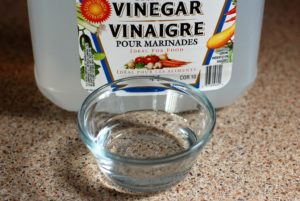
Vinegar has anti-microbial and anti-bacterial properties. Its active ingredients: 5% acetic acid
The latter prevents the proliferation of certain pathogens such as: Clostridium botulinum, Salmonella, Listeria, Staphylococcus, Escherichia coli
The vinegar is biodegradable, non-toxic, inexpensive and above all effective.
I also use white vinegar as laundry softener!
Baking Soda doesn’t contain Aluminium
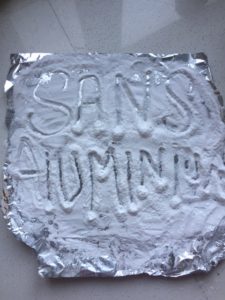 There is absolutely no need to buy organic / organic sodium bicarbonate. According to some, sodium bicarbonate would contain aluminum. This is not true, sodium bicarbonate is made of 100% sodium bicarbonate (natural or synthetic).
There is absolutely no need to buy organic / organic sodium bicarbonate. According to some, sodium bicarbonate would contain aluminum. This is not true, sodium bicarbonate is made of 100% sodium bicarbonate (natural or synthetic).
Is it possible that all of this started because Bob’s Red Mill Baking Soda says Aluminum-Free on the cardboard ??? I believe that this is the case. It seems to me that if it is indicated on a product that it does not contain aluminum, it certainly must means that the other brands contain it, right?
In short, it is an urban legend and sodium bicarbonate contains only sodium bicarbonate. That being said, the good little cow will do.
However, when buying Baking powder, make sure that it does not contain aluminum, as it often contains aluminum as an acid.
The baking powder is actually a 2 in 1. It contains both sodium bicarbonate and an acidic compound. In some cases, this type of baking powder contains one more ingredient: sodium aluminum sulphate (SAS) So be sure to read the list of ingredients before buying your baking powder.
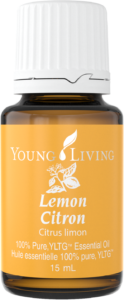 Lemon Essential Oil YLTG
Lemon Essential Oil YLTG
Here are some interesting properties about Lemon EO. Make sure that the essential oil you use is of excellent quality and has not been adulterated.
- Helps reduce symptoms of colds and coughs
- In aromatherapy, stimulates and awakens the senses
- stain remover
- Excellent for skin care (be careful about the sun, as the citrus HE can make your skin more sensitive to sunlight)
- Excellent cleaning agent
- I add 2 drops in my dishwasher to eliminate odors
- I also use it to degrease and remove the stickers that my children have placed everywhere!
- In my recipe, it helps to help eliminate waxes.
Did you know that it takes about 3000 lemons to produce 1 kilo of lemon essential oil? It is better to ensure that these lemons have not been watered with pesticides …
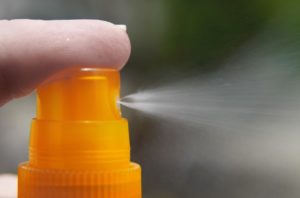
We can also prepare a small spray for immediate use by mixing 2 tbsp of sodium bicarbonate, 3 drops of essential oils of lemon (the eo will dissolved on sodium bicarbonate), 1/4 cup of vinegar and 1 cup of water. It is poured into a bowl and stirred until the bicarbonate is dissolved into water mixture. The resulting solution is then kept in a spray bottle. Tada!
List of 12 Fruits and Vegetables most affected by pesticides
Have you ever heard of the Dirty 12 and Clean 15 list?
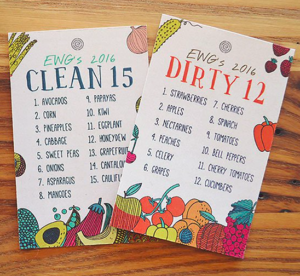
This is a list to which I refer regularly. According to EWG (Environmental Working Group) this list represents the fruits and vegetables that are the most and least affected/contaminated by the use of pesticides.
Pesticides are extremely toxic and we certainly do not want to add them to our diet. However, it is not always possible to buy our foods ”Organics”. In this case, it is always best to refer to the Dirty 12 & Clean 15 list to make our choices. If the food you want to buy is in the dirty 12 lists, then it would be better to privilege the organic version, while the foods on the clean list, may very well do the trick if they are not organic.
And above all, never forget to wash your food well, no matter where they come from….unless it’s from your grden. I little dirt never hurt anyone!!!
You can even print this list and keep it in your wallet. Use it as a guide and reference when making purchases.
Print Dirty 12 and Clean 15 list
I wish you all a yummy veggie day.
Isabelle Votre Amie Essentielle

